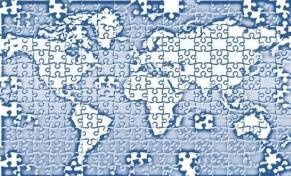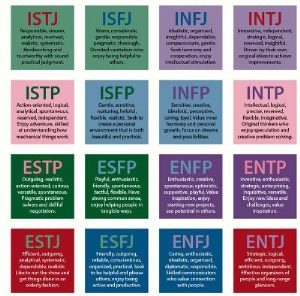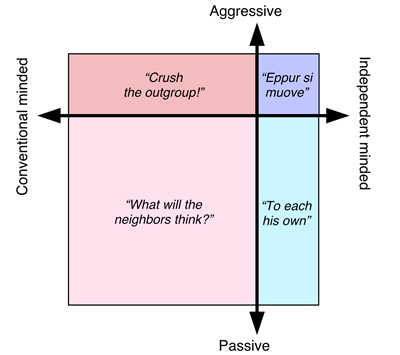Jeremie Averous's Blog, page 20
December 5, 2020
How the Split of Internet is Linked to the Strategic Value of User Data
Following up on our previous post ‘How Internet is Getting Increasingly Split‘, let reflect for a moment on the reason for this. I don’t believe it is just censorship. Of course the censorship motivation applies for many non-democratic countries, but the reason is probably deeper and has been highlighted by the TikTok events: ownership and access to user data.

Access to user data allows all sorts of manipulations as people can be targeted individually based on their preferences and hot buttons. It also provides an insight into the private life of individuals and may help setup compromission. In brief, it provides a strategic advantage that can be used to disrupt of manipulate social situations. It is a useful source of information for cyberwar, as shown by manipulations historically performed on American, British and less developed nations elections.
The recognition of the strategic value of user data is an interesting issue at the brink of the exponential development of the Internet of Things (IoT): even more data will be generated that is linked to our private life, and often while we are not conscious of what is really happening. This will in turn bring forth even more push to avoid foreign powers to have access to user data, necessarily promoting an increased split of internet. Global companies will have to develop strategies to locate data in the countries they are generated and provide security as to the usage by foreign powers.
The strategic value of user data has now been recognized, as well as its potential negative usage. And one can expect more consequences in the near future.
The post How the Split of Internet is Linked to the Strategic Value of User Data first appeared on The Fourth Revolution Blog.

December 3, 2020
How Internet is Getting Increasingly Split
A good summary of what is currently happening on the internet is given in those posts by Darin Stewart ‘Welcome to the Splinternet‘ and ‘TikTok is just the latest victim of the fracturing Internet‘. Of course the trend has been around for some time, but it now definitely clear that internet is not any more global, but multiple.

“What was promised as the great agent of globalization is rapidly becoming an enabler of isolationism. The borderless, digital frontier international businesses and organizations aligned themselves to is fragmenting. New borders and checkpoints are emerging.” “Technical fragmentation currently prevents roughly 25% of internet users, most in emerging markets, from accessing 70% of the Web. Political fragmentation has already divided the Internet into East and West, but recent developments are further divvying up the web into strongly bordered regional federations.”
This fragmentation has been driven by legal aspects (data protection laws), copyright and commercial issues, political issues (China being the best known, but India also participating) etc. It is quite interesting that this trend is parallel to the trend to reel back from globalization.
“Over time it creates a parallel reality that is extremely difficult to break out of. When amplified by the walled garden effect users are separated from non-aligned segments of the web as firmly as if they were on different networks altogether.”
When travelling it is possible to overcome some of the access limitations but when staying in one’s country, only advanced tricks will allow to overcome these limitations. Most people will increasingly be participating to a more limited version of internet. And that is probably reinforce the current issue of people being increasingly caught in the bubble of their own opinion and social network.
The post How Internet is Getting Increasingly Split first appeared on The Fourth Revolution Blog.

December 1, 2020
How Conversations with Artificial Intelligence Become Realistic
In this post ‘Conversations with GPT-3‘ we get some interesting insight about the experience of conversing with an artificial intelligence, on the basis of the largest natural language AI around, which was released in July 2020.

GPT-3 is “Generative Pre-trained Transformer 3 (GPT-3) is an autoregressive language model that uses deep learning to produce human-like text. It is the third-generation language prediction model in the GPT-n series created by OpenAI, a for-profit San Francisco-based artificial intelligence research laboratory” [Wikipedia]. It is one of the largest AI system produced so far.
“GPT-3 has been trained on most of what humanity has publicly written. All of our greatest books, scientific papers, and news articles. We can present our problems to GPT-3, and just like it transcended our capabilities in Go, it may transcend our creativity and problem solving capabilities and provide new, novel strategies to employ in every aspect of human work and relationships.”
The post presents some example of the texts that were predicted by AI. Well, the conversations are quite astounding even if of course, what “Wise Being” says (it is the name of the machine” is extracted from what we could call common knowledge. Take for example the conversation around Love.
The conclusion is that very soon we’ll be chatting with AI bots without even realizing that we are. They will regurgitate our entire knowledge in the right way, providing deep reach out in our collective culture and production.
The post How Conversations with Artificial Intelligence Become Realistic first appeared on The Fourth Revolution Blog.

November 28, 2020
How to Deal with the Gig Economy
The book by Diane Mulcahy ‘The Gig Economy: The Complete Guide to Getting Better Work, Taking More Time Off, and Financing the Life You Want’ provides an oversight of the changes in the modern employment market, and pieces of advice about how to get successful in that game.

Before quoting the main principles of the book, I need to emphasize that it is quite hard to become successful in the gig economy, as it is in any other endeavor. But even more so because the individual performance can be expected to follow a power-law curve as in any complex market, with the top performers pocketing much more than the average performer. It requires a lot of focus and effort, and many will struggle. Nevertheless, here are the principles recommended and developed in the book:
Define Your Personal Vision of SuccessDiversify and expand your networkCreate Your Own Security netConnect Without Networking (decide if inbound or outbound marketing is best for you)Face Personal Fears by Reducing RiskTake Time Off between GigsBe Mindful About Time – focus on what mattersBe Financially Flexible by restructuring your financial lifeThink Access , Not OwnershipSave for a Traditional Retirement . . . but Don’t Plan on Having One
As you can see in the above, a lot of advice is actually on changing one’s definition of success and making sure that your financial situation is flexible and resilient (or even considering living with less income on average). It is somewhat defensive at times. I tend to believe that entering the gig economy is a personal choice that needs to correspond to a flexible way of life, and that many people may be overwhelmed by the effort.
I believe we have not yet found the right social model for the gig economy. While I am convinced that in the future there will be more flexibility in the workplace and in terms of career, the economy is not yet mature to allow this to happen with the right social support network.
The post How to Deal with the Gig Economy first appeared on The Fourth Revolution Blog.

November 26, 2020
How We Need to Be Graceful in Times of Crisis
I like this quote attributed to Dustin Poirier (an American martial art artist): “When times are good, be grateful, and when times are tough, be graceful“. I find it fits particularly well with the current economic crisis.

I was of course particularly touched by the recommendation to be graceful when times are tough. This is hard, and requires a lot of awareness. Too many people tend to focus on their own interest and lose gracefulness in tough times. This can be observed every day in the current Covid economical crisis.
I realize however through the quote that the appropriate mindset to deal with tough times also comes with the need to be grateful when success hits. It comes to recognize that we are not the sole cause of our success and that many others have contributed; and that is also why it is important to be graceful when times are tough with everyone and everything that surrounds us and contributes to our being.
Gracefulness in crisis is not easy when stress is high and the horizon is blocked by unknown factors. I still believe it is a good mindset to strive to. Are we all sufficiently graceful in the current crisis?
The post How We Need to Be Graceful in Times of Crisis first appeared on The Fourth Revolution Blog.

November 24, 2020
How Changing Ourselves and Be Happy Is Our Responsibility
In her book ‘What I know for sure‘, Oprah Winfrey makes the point that changing ourselves, overcoming our wounds and overcoming our internal program are things for which we need to take total responsibility.

“Like me , you might have experienced things that caused you to deem yourself unworthy . I know for sure that healing the wounds of the past is one of the biggest and most worthwhile challenges of life. It’s important to know when and how you were programmed, so you can change the program. And doing so is your responsibility, no one else’s. There is one irrefutable law of the universe: We are each responsible for our own life.”
This responsibility can be tough to carry and we may need some help with it, but it certainly remains ours. And, “If you’re holding anyone else accountable for your happiness, you’re wasting your time.“
What I like in this quote is that first, it presumes that all of us can change and even recover from deep wounds, if we are willing to do so. And it squarely puts the responsibility on us for our happiness. Stop looking for excuses outside and do the work!
The post How Changing Ourselves and Be Happy Is Our Responsibility first appeared on The Fourth Revolution Blog.

November 21, 2020
How to Explain the Excessive Usage of Personality Tests Results
In a professional environment or out of personal curiosity, we’ve all taken personality tests that indicate our strengths and weaknesses. Why are those reductive tests so popular and in use? In David Epstein book ‘Range: Why Generalists Triumph in a Specialized World‘, the author takes the position that it respond to our and organisation needs to classify us and pigeonhole us.

“A lucrative career and personality quiz and counseling industry survives on that notion. “All of the strengths-finder stuff, it gives people license to pigeonhole themselves or others in ways that just don’t take into account how much we grow and evolve and blossom and discover new things,” . “But people want answers, so these frameworks sell. It’s a lot harder to say, ‘Well, come up with some experiments and see what happens.’”
On one hand I find those tests quite insightful and they generate useful thinking about oneself and what we should reinforce or change; on the other hand it is true that they tend to classify us. By the way, the best advice is certainly not to try to improve weaknesses but rather to further enhance those strengths that make us so specific.
Organisations are then advised to seek diversity (i.e. a set of people which results to the test spread nicely across categories), and may outright reject applications on the basis of test results.
Those tests are an extremely reductionist approach to our personality and they also don’t account at all on the fact that we may evolve. Taking important decisions on their basis and letting them classify ourselves in categories is certainly excessive. They should remain as an interesting insight in our personality, but should not be used beyond a certain limit.
The post How to Explain the Excessive Usage of Personality Tests Results first appeared on The Fourth Revolution Blog.

November 19, 2020
How Life Coaches Should Be More Aware of Their Limits
This interesting article addresses a key question: ‘Life coaching is unregulated and growing rapidly. Should it be reined in?‘. As life coaching becomes more prevalent as a career and service, shouldn’t it become more regulated and should not access to the profession become more restricted?

Of course the article is written by a psychiatrist and therefore he complaints about the amateurish handling by coaches of exchanges that border on therapy (and tends to protect his profession, degree and the many years of associated suffering). Coaching is “intended for individuals without mental health problems. It’s also supposed to be more collaborative, brief, focused, future-oriented and informal than psychotherapy.” However, “it must be difficult for a coach to come across as anything other than a therapist. Common topics for leadership coaches – performance maximisation, workplace relationships and professional anxiety – are the bread and butter of many a therapy session. The confusion is even greater with coaching outside of the work environment, which can encompass, as the ‘life coach’ moniker makes clear, just about anything.”
The author also makes an excellent point on the issue of stigma getting into psychotherapy. “People who are concerned about stigma might think that coaching offers a creative workaround – a malleable means of offering therapy under a different guise and a different name. While the motivation might be noble and understandable, the reality is scary.“
From my own experience of coaching, I believe the point made can be sometimes valid. While coaches have a high-level training about the fact that there is a border beyond which they are not supposed to intervene, and require psychotherapy, this training is quite limited. Also, I have observed that many life coaches have entered into this activity following strong personal issues, questioning and sometimes difficult events, sometimes more as a way to discover themselves. They are not always extremely stable themselves, and they sometimes investigate areas that should be off-limits. They should probably be made more aware of their limits.
I am a strong supporter of coaching as a softer way to challenge people and enhance their underlying performance. Coaching training if done properly is quite thorough, but it is true that more exchange with psychotherapy professionals and more awareness of the limits of coaching versus therapy would probably be useful.
The post How Life Coaches Should Be More Aware of Their Limits first appeared on The Fourth Revolution Blog.

November 17, 2020
How Non-Conformists Must Find New Safe Spaces
In this comprehensive post by Paul Graham ‘The Four Quadrants of Conformism‘, he addresses what is the type of person moves that actually move the world (hint: they are quite few in number). The challenges raised by an increase in conformism in the current world are also exposed.

The quadrant of conformism is the degree of conformism axis against a passive/active axis. This creates roughly four types of people and it would be linked more to personality than cultural influence. There are more conventional-minded than independent-minded people, and fewer active/aggressive people than passive.
“Why do the independent-minded need to be protected, though? Because they have all the new ideas. To be a successful scientist, for example, it’s not enough just to be right. You have to be right when everyone else is wrong. Conventional-minded people can’t do that. For similar reasons, all successful startup CEOs are not merely independent-minded, but aggressively so. So it’s no coincidence that societies prosper only to the extent that they have customs for keeping the conventional-minded at bay“
“In the last few years, many of us have noticed that the customs protecting free inquiry have been weakened.” We are reverting to a pre-enlightenment situation where people were expected to be passive and conventional. The fact that universites are becoming locations where intolerance becomes prevalent, while they have historically, on the contrary, be places of tolerance and investigation, is a worry. This safe space has not been replaced by the internet or other safe locations.
“Though I’ve spent a lot of time thinking about this situation, I can’t predict how it plays out. Could some universities reverse the current trend and remain places where the independent-minded want to congregate? Or will the independent-minded gradually abandon them? I worry a lot about what we might lose if that happened.”
“But I’m hopeful long term. The independent-minded are good at protecting themselves. If existing institutions are compromised, they’ll create new ones. That may require some imagination. But imagination is, after all, their specialty.“
Our increasing conventional society is a worry, but I believe we underestimate the existence of free inquiry possibilities as information is becoming increasingly available. Innovators had to be close to universities and their incomparable library; this constraint is now obsolete and virtual locations will develop offering the same possibilities.
The post How Non-Conformists Must Find New Safe Spaces first appeared on The Fourth Revolution Blog.

November 14, 2020
How Self-Help Approaches Can Be Summarized
I liked this quite ambitious post ‘Every self-help book ever, boiled down to 11 simple rules‘. And as we speak of apparently a $11 billion self-help industry, that’s even more ambitious!

Here’s a summary of those eleven points reworded by me
take a small step at a time – change should come in small chunksvisualize where you want to get tostruggle is good because you need to get out of your comfort zone. It will necessarily be scarybe emphatic and take some time to judge peoplecontemplate your mortal nature to act with a sense of urgencybe playful in change, cultivate your specificitieshelp others and be useful in lifeavoid perfectionism, which leads to procrastination. Just ship to the worldaccept human limitations and play the long game recharging your batteries when neededwrite down objectives and do listsdon’t just read, go out in the world and try
I am not sure this summarizes all self-help books around but it is certainly a good try. And like me you’ll find probably a pair of points that are worth remembering now because we may not have been sufficiently careful about them in the recent past.
The post How Self-Help Approaches Can Be Summarized first appeared on The Fourth Revolution Blog.




